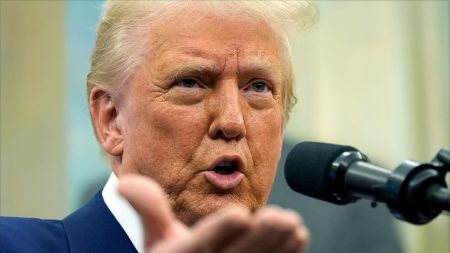Introduction: The Escalating Trade Tensions Between the U.S. and EU
The relationship between the United States and the European Union has hit a rough patch as trade tensions escalate over U.S. tariffs on steel and aluminum. In a strong response to President Donald Trump’s decision to impose a 25% tax on imported steel and aluminum, European Union Commission President Ursula von der Leyen vowed that these measures "will not go unanswered." The EU has made it clear that it will take firm and proportionate countermeasures to protect its economic interests. This move signals a potential trade war that could have far-reaching consequences for businesses and consumers on both sides of the Atlantic.
Von der Leyen emphasized that tariffs are essentially taxes that harm businesses and consumers alike. She stated, "Unjustified tariffs on the EU will not go unanswered—they will trigger firm and proportionate countermeasures." The EU’s stance is clear: it will not stand idly by while its industries are unfairly targeted. Instead, it is prepared to retaliate with measures that could impact iconic American products such as bourbon, jeans, and motorcycles. These products are not only symbols of American culture but also significant exports that could suffer as a result of the EU’s countermeasures.
The EU’s Plan for Countermeasures
The EU is not taking the U.S. tariffs lightly. Bernd Lange, the chair of the European Parliament’s trade committee, warned that previous trade measures, which were suspended during earlier disputes, could be easily revived. Lange mentioned that the EU’s countermeasures would target a range of American products, including motorcycles, peanut butter, bourbon, whiskey, and jeans. These products were chosen strategically, as they are not only major U.S. exports but also have significant cultural and economic importance.
Lange made it clear that the EU is prepared to act swiftly if the U.S. tariffs come into force on March 12. He told German radio, "When he starts again now, then we will, of course, immediately reinstate our countermeasures." This signals that the EU is ready to escalate the situation if necessary, potentially leading to a full-blown trade war. The EU Commission, which handles trade negotiations on behalf of the bloc, has not yet finalized the specifics of its countermeasures. However, officials and observers suggest that the measures will target Republican states and traditionally strong U.S. exports, aiming to maximize the political and economic impact.
The Economic Impact of the Tariffs
The U.S. tariffs on steel and aluminum are intended to provide relief to American producers who are struggling with intense global competition. By imposing a 25% tax on foreign steel and aluminum, the Trump administration hopes to allow local producers to raise their prices and gain a competitive edge. However, this move has been met with criticism from the EU, which argues that the tariffs are "economically counterproductive."
EU Commission Vice-President Maroš Šefčovič highlighted the deeply integrated production chains that exist between the U.S. and the EU, thanks to their extensive transatlantic trade and investment ties. He warned that disrupting these chains could have negative consequences for both economies. Šefčovič stated, "We will protect our workers, businesses, and consumers," but also made it clear that the EU prefers a constructive dialogue over a trade war. The EU estimates that the trade volume between the two sides stands at approximately $1.5 trillion, representing about 30% of global trade. This underscores the high stakes involved in this dispute.
The EU’s Commitment to Dialogue and Cooperation
Despite the tough rhetoric, the EU has expressed a willingness to engage in negotiations to resolve the issue amicably. Šefčovič emphasized that the EU remains committed to finding mutually beneficial solutions and stands ready for constructive dialogue. He said, "It is not our preferred scenario. We remain committed to constructive dialog. We stand ready for negotiations and to find mutually beneficial solutions where possible."
This approach reflects the EU’s recognition that trade wars are ultimately detrimental to both sides. As German Chancellor Olaf Scholz noted, "Ultimately, trade wars always cost both sides prosperity." Scholz reiterated the EU’s unity in the face of the U.S. tariffs, stating, "If the U.S. leaves us no other choice, then the European Union will react united." The EU’s commitment to dialogue suggests that it is open to finding a resolution that avoids further escalation, but it is also clear that it will not hesitate to act decisively if necessary.
The Broader Implications of the Trade Dispute
The trade dispute between the U.S. and the EU has significant implications for the global economy. The EU’s strong response to the U.S. tariffs highlights the interconnected nature of international trade and the potential consequences of protectionist policies. The EU’s willingness to impose countermeasures on iconic American products serves as a reminder that trade disputes can have far-reaching effects on businesses and consumers alike.
The EU’s emphasis on safeguarding its economic interests also underscores the importance of maintaining a level playing field in global trade. While the U.S. tariffs are intended to support domestic industries, they risk disrupting the delicate balance of transatlantic trade relations. The EU’s commitment to dialogue and cooperation offers a glimmer of hope that the dispute can be resolved without inflicting lasting damage on either economy. However, the situation remains fraught with uncertainty, and the outcome will depend on the willingness of both sides to engage in constructive negotiations.
Conclusion: A Call for Cooperation in the Face of Economic Uncertainty
The escalating trade tensions between the U.S. and the EU serve as a stark reminder of the challenges of maintaining a balanced and fair global trade system. While the U.S. tariffs on steel and aluminum are intended to support American producers, they have sparked a strong reaction from the EU, which is determined to protect its economic interests. The EU’s plan to impose countermeasures on iconic American products highlights the potential consequences of this dispute for businesses and consumers on both sides of the Atlantic.
As the situation unfolds, the EU has made it clear that it prefers dialogue over conflict. The bloc’s commitment to constructive negotiations offers a path forward, but it also underscores the need for both sides to engage in good faith. The high stakes involved in this dispute—approximately $1.5 trillion in annual trade—underscore the importance of finding a resolution that avoids further escalation. Ultimately, the outcome of this trade dispute will depend on the ability of the U.S. and the EU to work together to address their differences and find mutually beneficial solutions.















